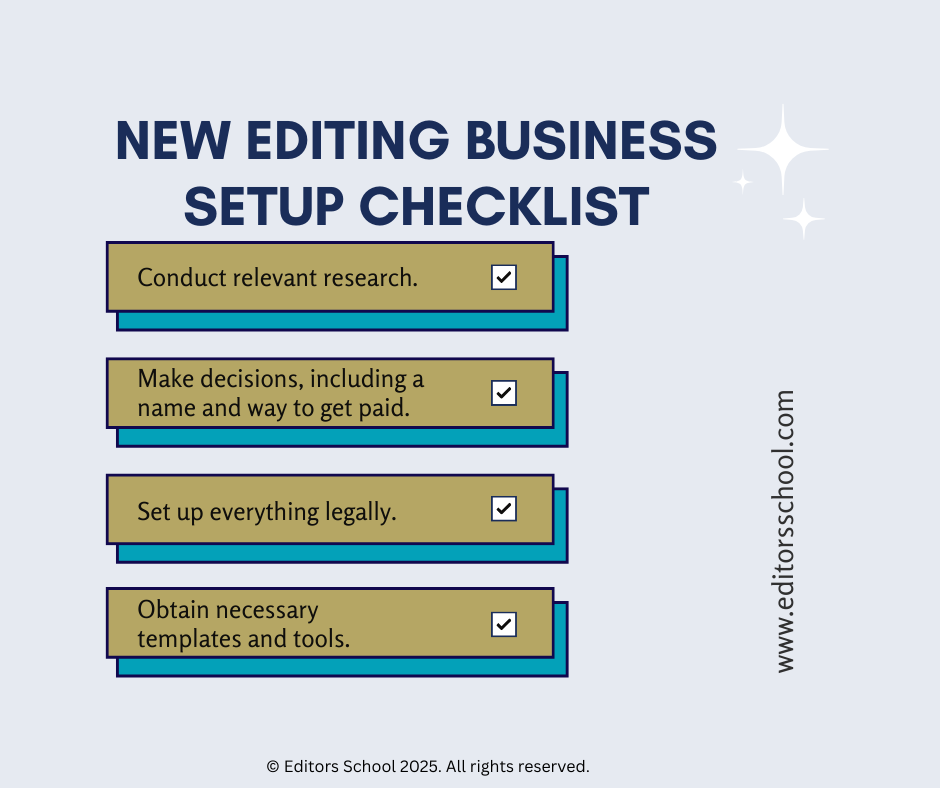
New Editing Business Setup Checklist Be Fearless
- Editors School Admin
- 0
- Posted on
Introduction
You’re ready to start offering editing services—but where do you even begin?
Do you need a business name? A contract? An LLC? A separate bank account?
This new editing business setup checklist walks you through the essential steps without the fluff or overwhelm. That way, you can start confidently and professionally. You can be fearless.
You don’t need a complicated legal structure or a website with bells and whistles. You just need a strong, simple foundation.
Image Suggestion
Alt Text: “Checklist on a clipboard beside a laptop, with coffee and sticky notes, showing a freelance editor’s startup workspace.”
Concept: Calm, cozy business planning for solopreneurs
The Editing Business Setup Checklist
Choose a Business Name
You can use your real name (plenty of editors do), or you can create a brand name.
Just make sure the name is:
- Not already in use
- Available as a domain or email handle (if you care about that)
Simple is fine. Clear is best.
Register Your Business (If Required in Your Area)
In many U.S. states, you can operate as a sole proprietor with your own name.
If you use a different business name, you may need to register a DBA (“doing business as”) with your county.
Some editors choose to set up an LLC later for liability protection and tax purposes—but it’s not required to get started.
Get an EIN (Employer Identification Number) from the IRS
It’s free, easy to apply for online, and useful even if you don’t have employees.
An EIN lets you:
- Keep your Social Security Number private.
- Open business bank accounts.
- Issue professional invoices.
It takes about 10 minutes and gives your business a more official presence.
Open a Business Bank Account
Even if it’s just a second checking account under your name, it helps you:
- Keep income and expenses organized
- Avoid mixing personal and business funds
- Simplify tax season (your future self will thank you)
Set Up a Way to Get Paid
You don’t need a fancy system—just one that’s reliable and easy for your clients.
Options include:
- PayPal Business
- Stripe
- Wave (great free invoicing tool)
- Zelle (for clients you trust)
Decide on your payment terms early (e.g., 50% upfront, final due on delivery).
Create a Simple Client Contract
This doesn’t have to be a 5-page legal document. A short, clear agreement with:
- Scope of work
- Deadlines
- Payment terms
- What’s included (and what’s not)
…will protect both you and your clients.
Editors School includes ready-to-use templates for this.
Build a Portfolio or Testimonials Page (Optional—but Powerful)
You don’t need a full website to begin—but having something to show helps.
Options:
- A Google Doc or PDF with before/after samples
- A Notion page or simple website
- A brief testimonials section with real client praise
Start small and build as you grow.
Choose a Bookkeeping Method
You don’t need to hire a CPA right away, but tracking your money matters.
Start with:
- Wave (free)
- QuickBooks Self-Employed
- Or a good old spreadsheet
Track every dollar in, every dollar out, and save receipts.
Future-you (and your tax pro) will be glad you did.
Don’t Let This List Scare You
You don’t have to do everything at once.
You don’t have to spend thousands of dollars to be “official.”
Take it one step at a time. Start where you are. Grow from there.
You can run a real business even in your bathrobe, even while homeschooling, even if you’re still figuring things out.
Conclusion
Getting your editing business setup right doesn’t have to be stressful.
This checklist gives you a clear, realistic foundation to serve clients with confidence—and to grow into the editor (and business owner) you’re meant to be.
You’ve got this. One step at a time.
TL;DR:
This book editor business setup checklist covers the real-world essentials: choosing a name, registering if needed, getting paid, creating a simple contract, and tracking your money—without the overwhelm.
FAQ
Q: Do I need to form an LLC to be a book editor?
A: No. Most editors start as sole proprietors and may choose to form an LLC later.
Q: What should go in my client contract?
A: Scope of work, deadlines, payment terms, and revision policies. Editors School includes editable templates.
Q: Is a separate bank account really necessary?
A: Technically no, but it keeps things clear and makes taxes so much easier.
Q: What’s the best way to send invoices?
A: Wave is a great free option. PayPal Business and Stripe are also widely used.
Q: Can I start without doing all of this?
A: Yes—but each step you take helps you feel more confident and professional.
Call to Action
Choose your CTA text from the options below (just hyperlink the one you like):
- Download the editable Book Editor Business Setup Checklist
- Join Editors School to get step-by-step setup guidance and customizable templates
- Explore our Freelance Editor Startup Kit